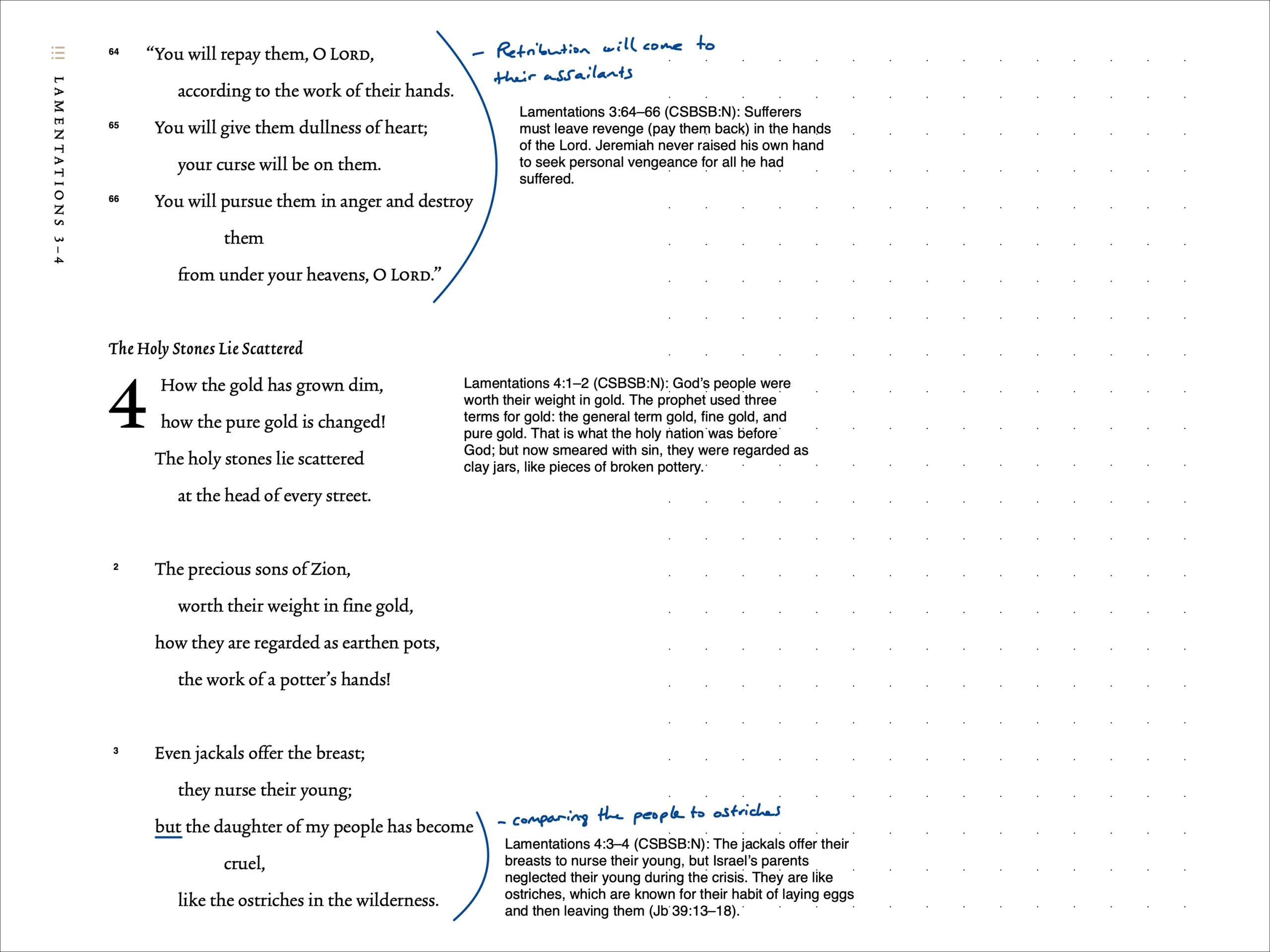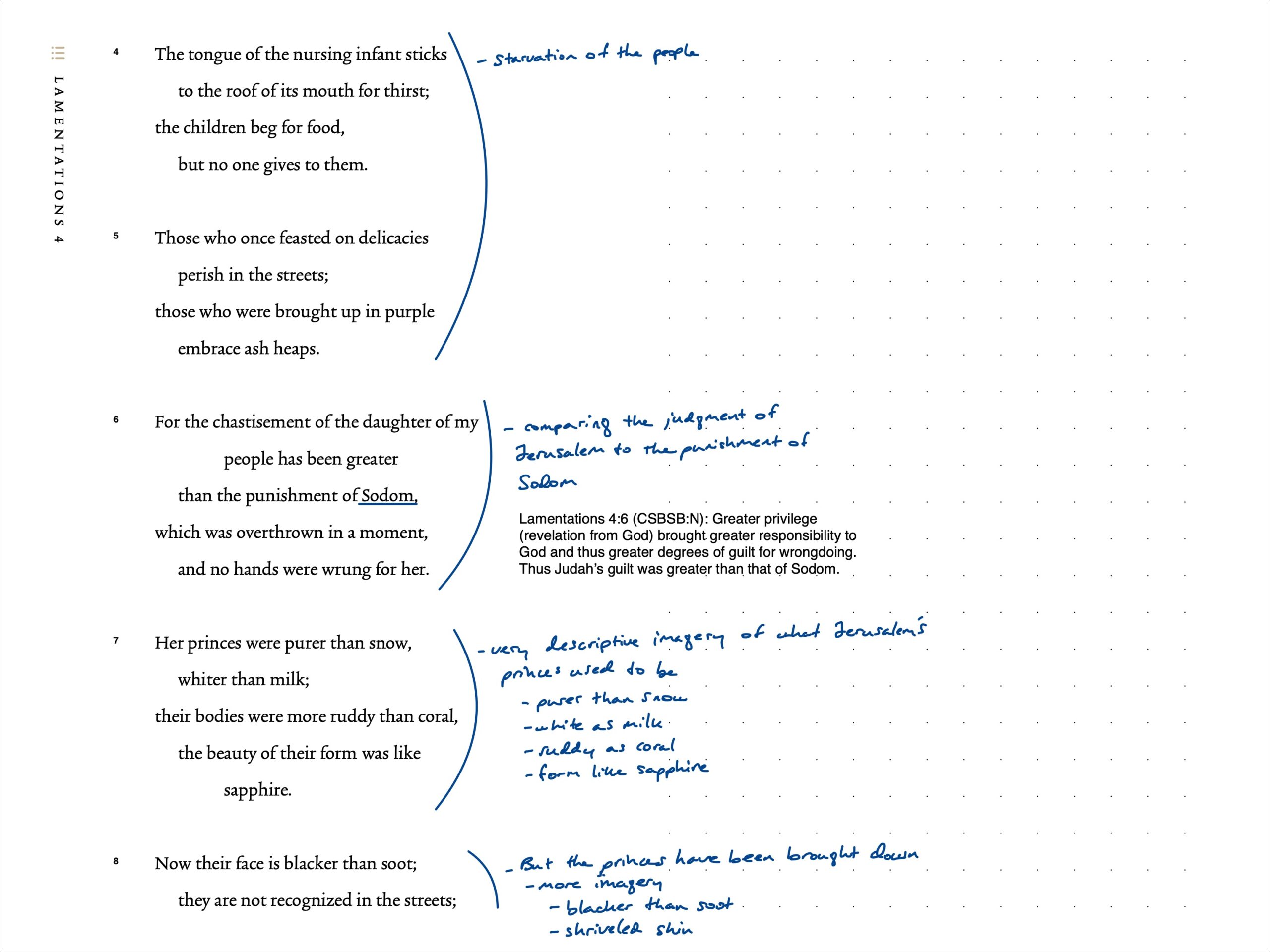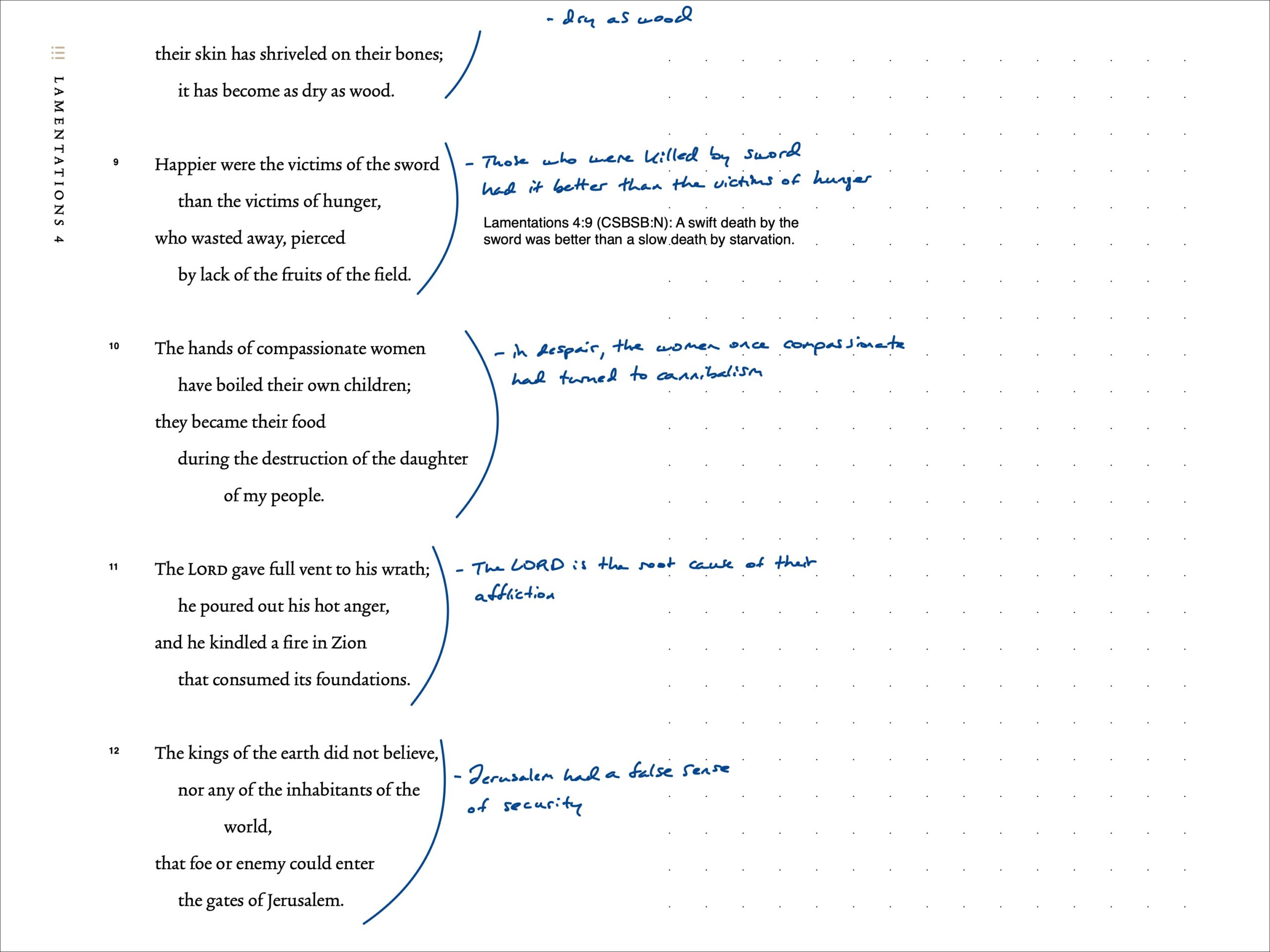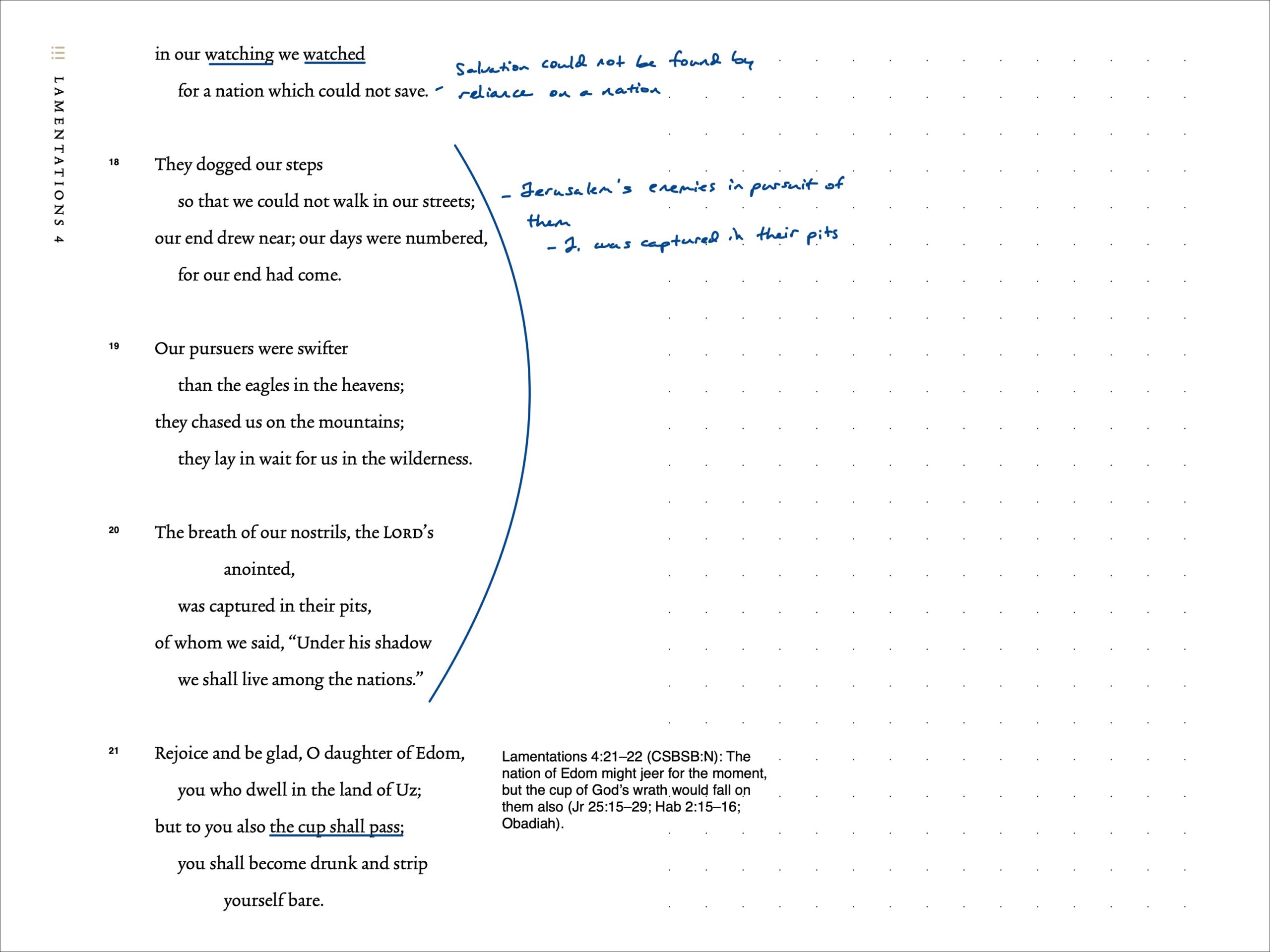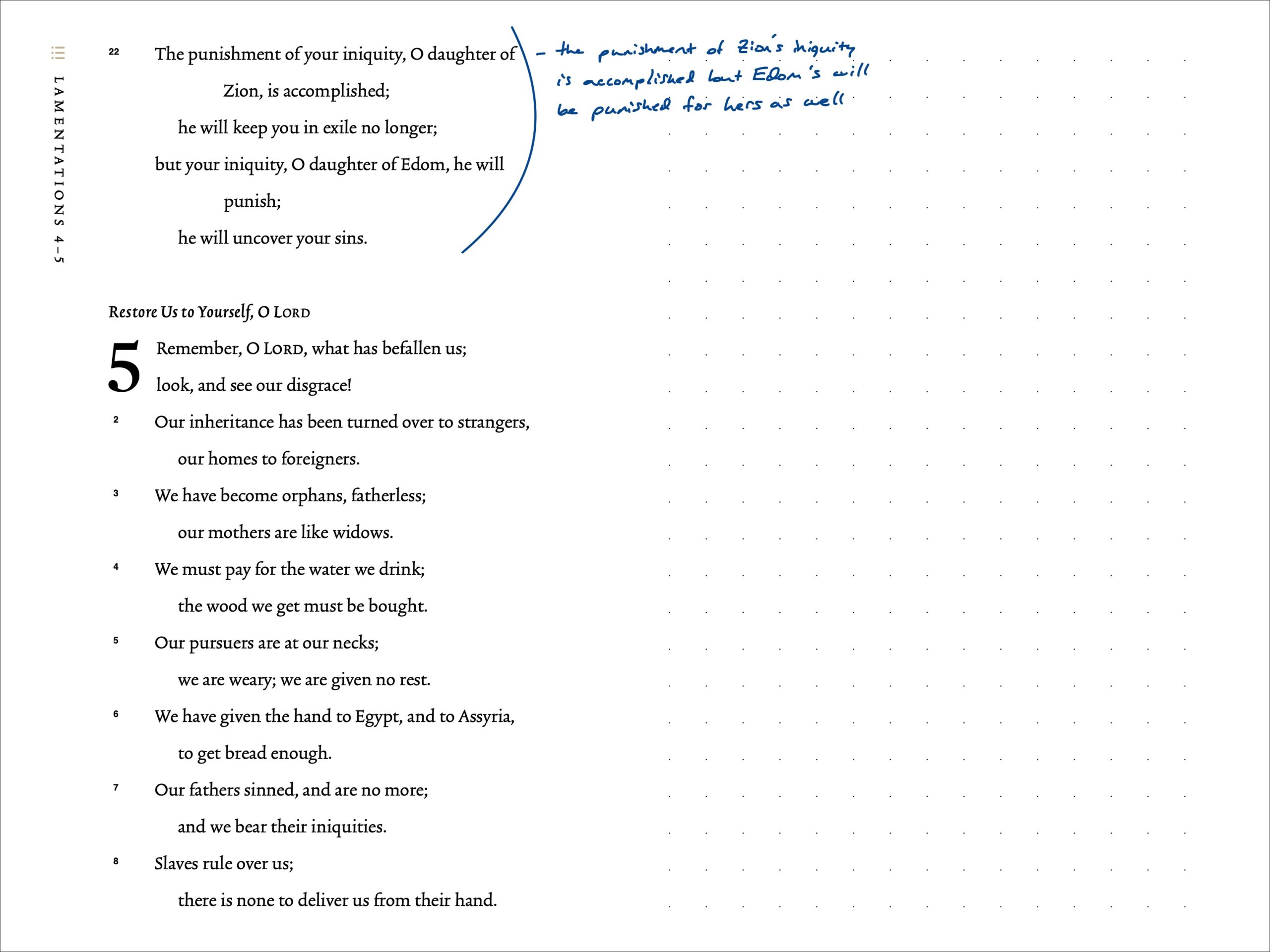| Date | Version | Reading Plan |
|---|---|---|
| @August 19, 2023 | ESV (2016) | ESV Prophets Plan 2023 |
Pericopes
- The Holy Stones Lie Scattered
Notes
The chapter opens with a description of Jerusalem’s people as worth their weight in gold. The prophet used the terms 1) gold, 2) fine gold and 3) pure gold. However, they had become smeared with sin and were now regarded as pieces of broken pottery.
Lam. 4:3 speaks of how even jackals nurse their young but the daughter of God’s people had become cruel, neglecting their young in time of crisis. The people are compared to “ostriches in the wilderness”, which are known for their habit of laying eggs and then leaving them (see Job. 39:13-18).
Lam. 4:4-5 speak of the thirst and starvation of the people, that the “tongue of the nursing infant sticks to the roof of its mouth” and the “children beg for food” (Lam. 4:4). The once prosperous who “feasted on delicacies” now “perish in the streets” (Lam. 4:5).
Lam. 4:6 compares the judgment of Jerusalem with the punishment of Sodom. Greater privilege (revelation from God) brought greater responsibility to God and thus greater degrees of guilt for wrongdoing. This made Judah’s guilt greater than Sodom.
Lam. 4:7-8 contrasts the former prosperous state of Jerusalem’s princes with their current lot in suffering and very descriptive imagery is used of both. Her princes were once: 1) purer than snow, 2) white as milk, 3) ruddy as coal and 4) had form like sapphire. But now the princes had been brought down and were 1) blacker than soot, 2) had shriveled skin and 3) dry as wood.
Lam. 4:9-10 describe how a swift death by sword was better than a slow death by starvation. In their despair, the once-compassionate women had turned to cannibalism and “have boiled their own children” (Lam. 4:10).
Lam. 4:11 represents a crucial underlying layer for the book as a whole. While it was Judah’s enemies who had come upon them, it was the LORD who was the root cause, giving “full vent to his wrath” and pouring out “his hot anger”. He had “kindled a fire in Zion”, with fire as the oft image of divine judgment.
Lam. 4:12 is of how Jerusalem had been lulled into a false sense of security, neither the kings nor her inhabitants believed that “foe or enemy could enter the gates of Jerusalem”.
Lam. 4:13-15 reveals that the reason for this tragedy was the sins of the prophets and the iniquites of the priests. Jeremiah had warned them time and time again (Jer. 6:13; Jer. 8:8–12; Jer. 23:11–36; Jer. 26:7–24; Jer. 28:1–17). Now no one dared to touch their garments and they were the outcasts of the society. They wandered blind through the streets (Lam. 4:14) and the people declared them unclean, yelling at the priests and prophets not to touch them. (Lam. 4:15)
Lam. 4:18-20 is of Jerusalem’s enemies in pursuit of her, that her “pursuers were swifter than the eagles in the heavens” and “they lay in wait” for her “in the wilderness” (Lam. 4:19). Jerusalem was captured “in their pits”. (Lam. 4:20)
The remaining verses (Lam. 4:21-22) are of both Edom and Zion (representing Jerusalem). The nation of Edom might jeer for the moment at Jerusalem’s punishment but the cup of wrath would fall on them also (Jer. 25:15–29; Hab. 2:15–16; Obadiah).
Application
Two very important concepts emerge in this chapter, namely that 1) it was God who instituted and carried out the judgment and 2) the root cause was sin and iniquity. Again, this dismantles any notion of God being love but soft and squishy in His justice. God hates sin and is very active His dealings with it. God is incredibly patient and longsuffering but, as we see in Jeremiah’s writings, they do have a definite end.
For those of us in the new covenant era, this points us to the return of Christ and of His final judgment. Certain is the day that a final dealing with sin will be had where the Lord will reap the harvest of His people and winnow the chaff. For those in Christ, it will be a glorious moment of rejoicing as the Lord ushers in the new heavens and earth, eternally reveling and singing to Him in psalms, hymns and spiritual songs. For those not, it will be most terrifying moment imaginable, being stripped of His presence and all manner of His blessing, perpetuating eternally in a state of torment.
Heavy stuff, but the weight of it must be felt in order to drive us to a healthy, reverent fear. Let us love Him now, serve Him now, cherish Him now, having posture of worship now that will extend into everlasting joy.
Scripture Journal Notes
Commentaries & Resources Used
- ESV Study Bible. (Wheaton, IL: Crossway, 2008)
- Faithlife Study Bible (Lexham Press, 2016)
- Believer’s Bible Commentary (Thomas Nelson, 2016)
- CSB Study Bible Notes (Holman Bible Publishers, 2017)
- Matthew Henry’s Commentary on the Whole Bible (Guardian Press, 1976)
- The Bible: A Reader’s Guide (Sterling Publishing, 2011)
- The Infographic Bible (Zondervan, 2018)
- ESV Digital Scripture Journal (Crossway, 2019)
